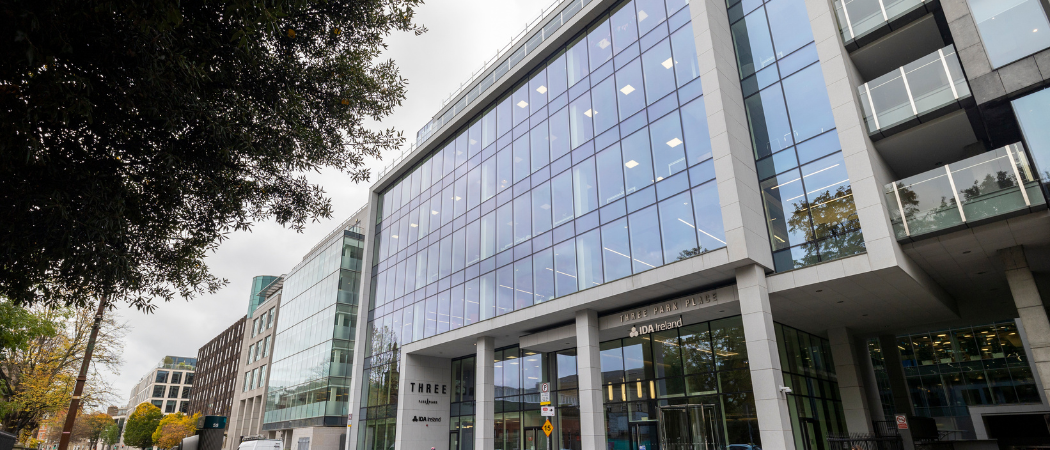The merger of two current science bodies is intended to bring about a step change in how R&I is funded

The new R&D agency Research Ireland will work with the inward investment agency IDA, whose offices are seen here.
The Irish government has officially launched its new R&D funding agency Taighde Éireann - Research Ireland – to combine the work of two previous national science funding bodies, as part of strategy to boost the country’s research system.
Research Ireland, “will enhance our capacity to address the issues Irish society is facing, in particular climate change and the digital transition,” said research minister Patrick O’Donovan, announcing the launch on 1 August.
The agency is an embodiment of Impact 2030, a 2022 plan to reform Ireland’s research and innovation system to maximise its impact on national priorities. This includes increasing EU research funding and collaborations, and applying innovation to make Irish businesses more competitive.
The Department of Further and Higher Education, Research, Innovation and Science is aiming for minimum disruption for the research community, as Research Ireland finds its feet, said Deirdre Lillis, assistant secretary at the department.
Research Ireland will combine the work of the Irish Research Council (IRC) and Science Foundation Ireland (SFI). As things stand, SFI funds basic and applied research in STEM subjects, while IRC funds all disciplines, including most of the arts, humanities and social sciences. Together, they manage a budget of around €300 million.
Lillis said that until the end of the year most effort will be devoted to setting up internal structures, including establishing Research Ireland’s board and familiarising it with the agency’s new structures, scope and strategy. For example, the board may compare the funding calls of SFI and IRC and remove any duplication.
Once up and running, researchers will have a single agency to apply for funding, while the Research and Innovation Act 2024 creating the agency means every research discipline now has a statutory footing.
O’Donovan said IRC and SFI will operate their services and funding programmes as usual while Research Ireland is being set up.
Legal fight
But it’s off to a shaky start. The agency is launching with only an interim CEO after the earlier choice was fired at the last minute over bullying allegations.
In May 2023, the then director of SFI, Phillip Nolan, was appointed as Research Ireland’s CEO in waiting. However, in May this year Nolan was fired by the SFI board as a response to an internal investigation into five allegations of bullying misconduct by senior staff.
Nolan denied the allegations, and a series of legal challenges has followed. As of now, the matter is not resolved.
When contacted by ScienceBusiness, Nolan said he welcomed Research Ireland. It is, “precisely the right strategic move for Ireland at this point in the development of its research and innovation system,” he said, but did not comment on the unresolved legal case.
In the face of the ongoing row, an interim CEO, Celine Fitzgerald, has been appointed. She has experience launching and reforming organisations in transition, such as the charity Goal Global and Ireland’s National Screening Service. Over the next few months her role will include building the organisation, as the board look to recruit a CEO for the long term.
Underfunded
Research Ireland will be servicing one of the most underfunded research communities in the EU. Although Ireland has the second highest GDP per capita in the EU, Eurostat figures show its 2022 government budget allocation to R&D was just 0.21%, the second lowest in the EU.
The private sector is plugging the gap, with government figures showing private funding accounted for 80% of all expenditure on R&D in 2021. That is far ahead of the 66% EU average. Despite the commercial investment, this has not led to more innovation: since 2017 Ireland has seen a decline in product and process innovation and intellectual assets, though patents increased in the last year.
Part of Research Ireland’s remit is to work with two of Ireland’s economic development agencies on research to help industry. Lillis says it will see how to best balance applied and basic research funding as it reviews SFI and IRC’s portfolios.
The European Commission has blamed low investment in R&D for the continent’s economic stagnation, and for decades has urged member states to increase spending to boost competitiveness.
More recently, the EU’s shift to strategic autonomy and loosening state aid rules means Ireland should participate more in EU programmes for digital and green technologies to stay competitive, says one report.
This is echoed in recent EU recommendations for the Irish economy, which suggest the EU Strategic Technologies for Europe Platform could improve competitiveness.
Impact 2030 wants to increase investment in research by companies and SMEs. Irish SMEs were successful during Horizon 2020, netting over €300 million from nearly 5,000 applications.
Delivering on this Impact 2030 objective will require more money from the national coffer, and the question of funding looms large over the new the agency. Ireland’s researchers have long complained about underinvestment. A survey by the Irish Universities Association (IUA) found that over half of its members’ equipment and research infrastructures are over a decade old.
“It's really, really dire in terms of the investment levels, particularly in research infrastructure” said Lisa Keating, director of research & innovation at IUA.
“We can't get service agreements on our equipment because it's so old. We can't get reagents to run the equipment because they’re no longer manufactured,” she said. The old equipment leads to some researchers choosing to pursue their research careers elsewhere with more modern facilities.
The Research & Innovation act creating Research Ireland’s wider scope means new funding is critical, as many more sectors will be in competition, Keating said. “The intention of the bill was that nobody would lose out. But the problem is the pot didn't get bigger.”
This is a cause for concern. “There isn't enough budget to do all that it's supposed to do,” she said. “If they said we're going to increase the budget by 50% and bring us in line with our counterparts, then I don't think people would be as worried.”
The budget concern extends to Brussels. Before the EU elections in June, IUA released a manifesto for all Irish candidates to pledge to protect funding for FP10, the successor to Horizon Europe. The manifesto notes that ring fencing the fund is a “key priority” for Ireland, especially the Pillar 1 Marie Skłodowska-Curie Actions, which fund young researchers for the country’s talent pipeline.
Future funding
Research Ireland’s most pressing obstacle is getting enough funding in the Irish government’s next budget, expected to be announced on 1 October.
In the Impact 2030 strategy, the government committed to spending at least 2.5% of domestic GDP on research before the end of 2030, and to get €1.5 billion of Horizon Europe funding.
In a pre-budget submission, one Irish research centre said the government should increase its budget for R&D from the current rate of around 0.35% gross national income to 1.0%, or at least the EU average of 0.71%.
(Ireland uses the alternative metric of gross national income, to exclude the huge effects that global tech and life science companies headquartered in the country have on headline GDP figures).
“I do think that […] an overhaul [is] need[ed] from the point of view of how do we do basic government sponsored or state sponsored research,” said Lorraine Byrne, executive director of AMBER, an SFI research institute focusing on advanced materials and bioengineering.
“As researchers, we'd like it to be more in line with 3%, where you see countries like Finland and Denmark [which] are really the innovation leaders in the European league tables,” she said.
Ireland is due to hold elections by March 2025. All this means that Research Ireland must deal with an unknown future for its CEO, budget and even research minister - all within the first year of its launch.
Nonetheless, Byrne is optimistic about the new agency. Its formation allows Irish researchers to plan their funding initiatives for the years to come.
“A lot of decisions are being delayed pending the establishment of the governance structure of Research Ireland,” she said. “At least now we know the structure coming in place that will enable those decisions, and we can move on.”
She says it is also a sign that there is momentum behind Impact 2030, which includes plans to create science policy forums, improve research careers, boost research with Northern Ireland and appoint science attachés in Ireland’s embassies and consulates.
“I think they will hit the ground running, with the pace with which communication has come out,” said Byrne. “The fact that you're seeing that action, I'm optimistic that other parts of Impact 2030 are now going to be enacted.”





 A unique international forum for public research organisations and companies to connect their external engagement with strategic interests around their R&D system.
A unique international forum for public research organisations and companies to connect their external engagement with strategic interests around their R&D system.